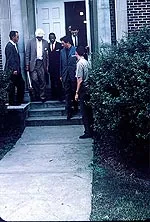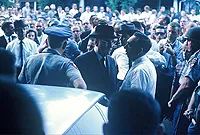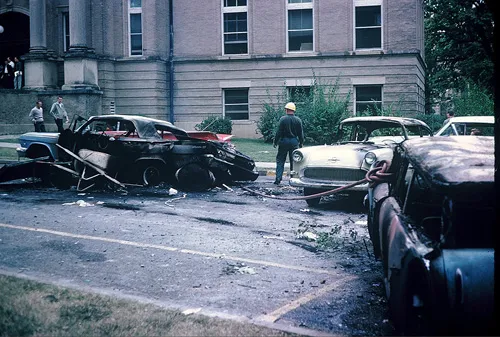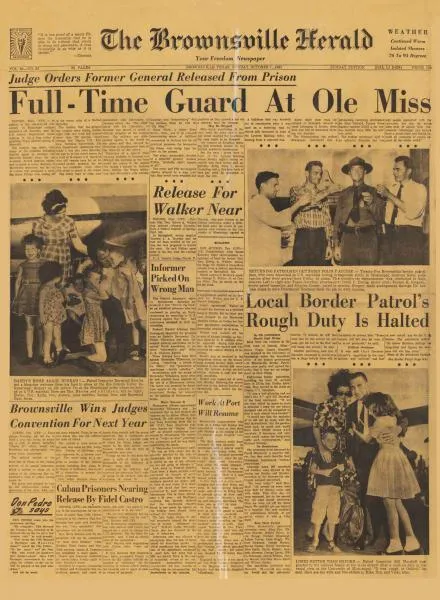
by Federal officials to
register for classes at the
University of Mississippi.
Copyright Estate of Donald
James Proehl.
During the Civil Rights Movement, upholding federal law frequently meant defying state and local governments, as well as managing hostile crowds. At one of the most significant moments in the movement, the U.S. Border Patrol joined U.S. Marshals to enforce federal law by protecting James Meredith as he registered as the University of Mississippi's first African-American student.
Meredith was an Air Force veteran and native of Kosciusko, Miss. In 1961, he applied to the University of Mississippi. When his applications were rejected, Meredith took the University to federal court. He won his case on appeal, and the Fifth Circuit Court of Appeals ordered the University to admit Meredith for the fall term of 1962. Despoiling this victory, Ben Cameron, a Fifth Circuit Court judge, negated the ruling even though he had not heard the case. The three-judge panel which heard the case appealed Cameron's actions to U.S. Supreme Court Justice Hugo Black. On September 10, 1962, he vacated Cameron's stays and ordered Meredith's admission to the University.

enrollment at the University of
Mississippi. Copyright Estate of
Donald James Proehl.
Mississippi state and local governments remained undeterred and worked in tandem to prevent Meredith's enrollment. He was arrested and jailed for a day by Hinds County officers. Jackson County Judge Homer Edgeworth convicted him, and the state legislature enacted a law that denied admission to state institutions to criminals. The federal courts once again intervened and ordered the University to enroll Meredith by October 2, 1962.
Protected by a small contingent of U.S. marshals, Meredith made fours attempts to register. They were turned back by state troopers acting on orders from Mississippi Governor Ross Barnett. President John F. Kennedy brought in marshals from across the country, but now thousands of protesters were blocking Mr. Meredith from registering at the University. More law enforcement personnel were needed. U.S. Border Patrol Agents were sworn in as deputy marshals and Border Patrol assets were employed for support.

Photograph of the following day.
Copyright Estate of Donald James Proehl.
On September 30, 1962, protests deteriorated into a riot, and Border Patrol agents worked through the night along side marshals and the National Guard to restore order. The Attorney General Robert Kennedy commended the heroism and restraint of the federal forces:

Border Patrol's role in the integration
of the University of Mississippi and
publishes interviews with agents. The
Herald also features pictures of the
return of agents from their “rough duty.”
. . . . if these men hadn't remained true to their orders and instructions, if they had lost their heads and started firing at the crowd, you would have had immense bloodshed, and I think it would have been a very tragic situation.
The next day James Meredith was taken to register at the University in a Border Patrol vehicle, which had been heavily damaged by the riot. Meredith described it as "battered and smashed; bullet holes had riddled the sides; the windows were all shot out."
Border Patrol agents also paid a price for their attention to duty. Of the over 300 agents deputized, 72 were injured. This included agents from Brownsville, Texas. The Brownsville Herald characterized their deployment as "rough duty" and on October 7, 1962, published an interview with Border Patrol Agent Bill Marshall. He reported a harrowing siege, stating that "All around us some men were hurt by thrown rocks and with clubs . . . . Once we were cut off for three hours. We couldn't get our wounded out. The mob wouldn't let ambulances through; it was a long night."
Due in part to Border Patrol agents, Meredith safely enrolled in the University and attended classes. He graduated on August 18, 1963.

